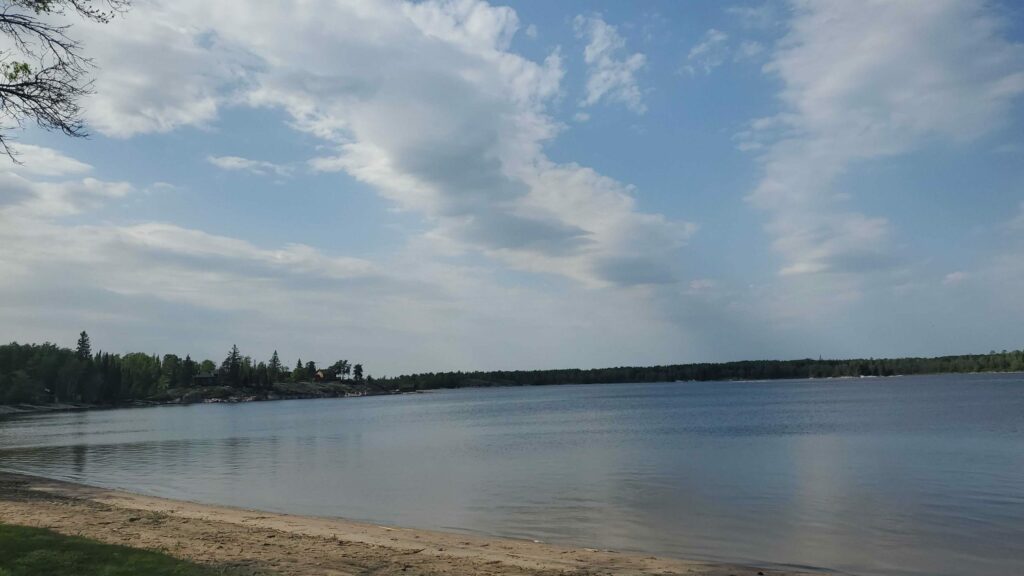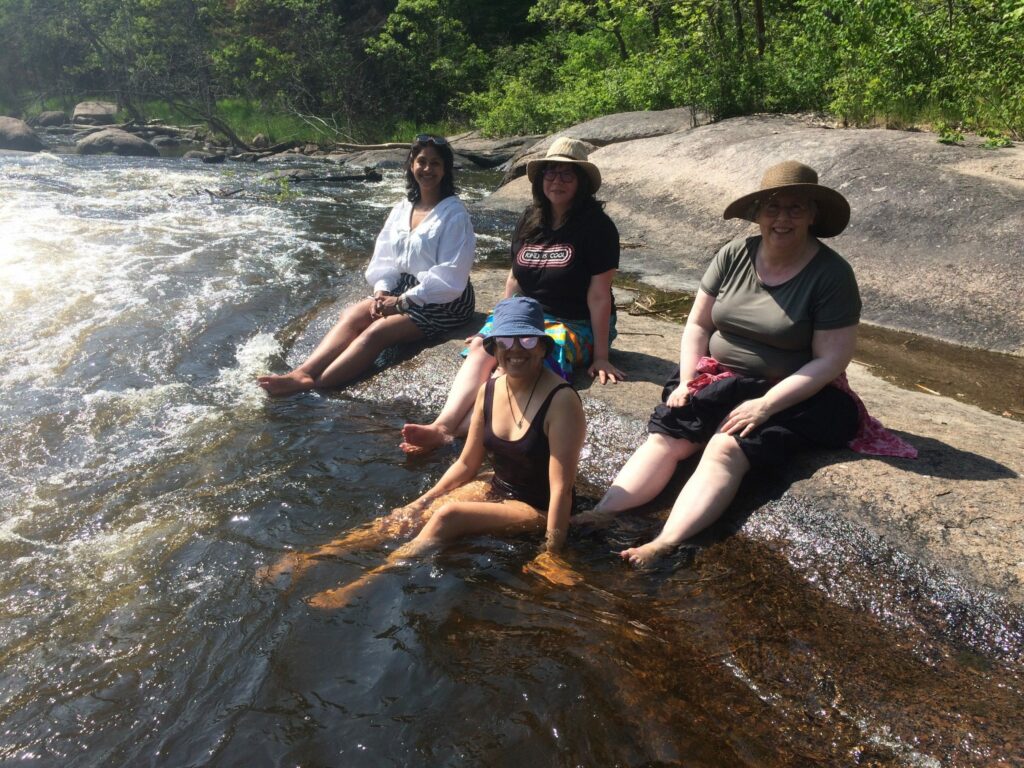By Eliza Maharjan
As I sit here reflecting on my first ever Nibi Gathering, I realized that the experience could not be summed up in a few sentences. It was an experience jam-packed with learning and sharing, stories and humor, laughter, and tears. Co-led by Anishinaabe legal scholar Aimée Craft and Anishinaabe environmental justice scholar Deborah McGregor, the gathering took place at Manitou Api, Whiteshell, Bannock Point on May 25-28, 2023. With a focus on “Building Water Relationships,” the gathering highlighted the importance of the language, songs, ceremonies, and teachings of the water.

Before attending the Nibi gathering, water, for me, was merely this non-living entity that aided my survival. But as I reflect on the teachings from the Nibi Gathering, I’ve come to see that water – Nibi – is life. It is to be protected, respected, and in the end, celebrated.
Attendees gathered in the teaching lodge, coming together in a collective spirit, to learn from stories and teachings. Smudge welcomed us to the teaching lodge helping purify and cleanse our souls and environment of any negative thoughts. The gathering embodied many Anishinaabe teachings. The Circle of the Medicine Wheel comprises the four elements: earth, water, air, and fire. Each of these elements accompanied the gathering. The lodge housed a sacred fire that was surrounded by the participants in a circle, the gathering was on land meaning the participants had a chance to connect with Mother Earth. The river enveloped the gathering place and the air helped keep the sacred fire alive. In a way, the gathering showed that everything is connected, just as the circle.

My day at the Nibi Gathering began with a water ceremony, led by women, symbolizing life and the significance of women as caretakers of the water. The teachings covered the value of water, the role of women as protectors of water, and how water is changing in their communities.
Throughout the day, we heard from different speakers about the sacred nature of Nibi (water) and the work being done to protect the water. This included guests from Colombia and Australia, who brought with them stories and teachings. The gathering fostered a sense of community where people from across the world could come together and share their stories. Their stories made me realize that distance didn’t affect the connections, their stories were similar, and this is what the gathering was about – connectedness.
The afternoon saw a water walk to the river led by a water song. Each song was engaging and came with its own knowledge. The group was led to the nearby river where they could offer the water from their land and connect with the water there. The songs echoed in the vastness where the songs carried generational knowledge. Initially, it was led by a single individual, but as they spent more time around the water, the voices grew louder, and the water heard different songs from different parts of the world. Again, geography might separate individuals, but the songs and collective shared experiences never fail to bring people closer; this was definitely the case in the Nibi gathering. The common theme that echoed during the water walk was that the body of water has roles and responsibilities, but importantly, so do we, and it is thus important to take care of it.
There were teachings about treaties, the importance of Treaty education, and the water treaty. The speakers talked about the relationship of Anishinaabe people with water and the responsibilities people have to protect it. Recognition of water as a spirit and having a life, can help in decision-making, the water governance process, and recognizing their rights. Another important idea that was discussed was decolonization which simply means having the freedom to make your own choices. So, giving rights to water and acknowledging the roles and responsibilities is a step closer to decolonization and this gathering succeeded in promoting this.
Laughter filled the lodge with stories and teachings shared by the Elders. I felt like the gathering was all about connectedness. The language was used as an instrument to connect with the land and decolonize. Education was then a tool used to rebuild languages. And lands and water are active participants involved in the process of learning. So, all of these components are interrelated. Nibi Gathering is thus unique, and inspiring, and provided a safe space for learning, healing, and connecting. The gathering gave me a new outlook on water and as an Environmental student, it has prompted me to respect the water and taught me a decolonized approach to seeing water and its protection. Water is integral to our survival, so it is our duty to respect it and finds ways to celebrate it.
To Learn More:
Craft, Aimée. (2023): https://aimeecraft.ca/
Craft, Aimée. (2021). Treaty Words: For as Long as the River Flows. Annick Press.
Craft, A., McGregor, D., Seymour-Hourie, R., & Chiblow, S. (2021). Decolonizing Anishinaabe nibi inaakonigewin and gikendaasowin research: Reinscribing Anishinaabe approaches to law and knowledge. In Decolonizing Law (pp. 17-33). Routledge.
Craft, Aimée. (2013). Breathing Life into the Stone Fort Treaty: An Anishnabe Understanding of Treaty One. UBC Press.
Craft, A., & King, L. (2021). Building the Treaty# 3 Nibi Declaration using an Anishinaabe methodology of ceremony, language and engagement. Water, 13(4), 532.
Decolonizing Water (2023): https://decolonizingwater.ca/
McGregor, D. (2004). Coming full circle: Indigenous knowledge, environment, and our future. American Indian Quarterly, 28(3/4), 385-410.
Nibi Declaration of Treaty 3 – Draft Toolkit: http://gct3.ca/wp-content/uploads/2019/05/2019-TREATY3-NIBI-TOOLKIT-FINAL-DRAFT-May-2019.pdf
University of Manitoba United Nations Sustainable Development Goal 6: https://umanitoba.ca/research/united-nations-sustainable-development-goal-6



